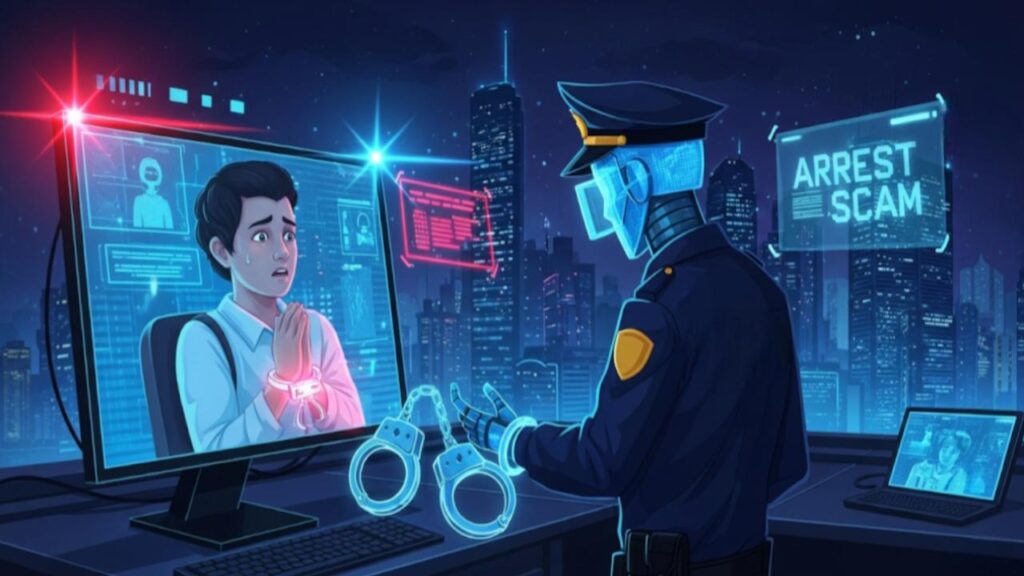In today’s fast-paced digital world, scams are evolving in ways that make them harder to detect. One of the most alarming types of fraud recently making headlines is the digital arrest scam. These scams involve fraudsters impersonating law enforcement officers, pressuring victims into transferring large sums of money under the threat of arrest. It’s a dangerous and manipulative scheme that can leave victims not only financially drained but also emotionally distressed.

Digital Arrest Scam
| Topic | Details |
|---|---|
| What is a Digital Arrest Scam? | A scam where fraudsters impersonate law enforcement officers to trick people into transferring money under the threat of arrest. |
| Impact | Thousands of people have been affected, with scams targeting vulnerable individuals, especially seniors. |
| Involved Banks | ICICI Bank, HDFC Bank, SBI, Yes Bank have come under scrutiny for not preventing such scams. |
| How to Protect Yourself | Always verify claims, report suspicious activity immediately, and never transfer money under pressure. |
| Legal Action | The National Consumer Disputes Redressal Commission (NCDRC) has issued notices to banks over their failure to detect and stop such scams. |
Digital arrest scams are a growing threat in today’s digital age. These scams manipulate victims through fear and intimidation, often leaving them financially ruined and emotionally scarred. While these crimes are difficult to detect, there are steps you can take to protect yourself. Always verify suspicious calls, never transfer money under pressure, and report any suspicious activity immediately.
By staying informed and taking the right precautions, you can minimize the risk of falling victim to these scams. Share this information with friends and family to ensure that more people are aware and can stay safe.
What Is a Digital Arrest Scam?
Digital arrest scams are a form of cybercrime that takes advantage of people’s fear of law enforcement. In these scams, criminals impersonate police officers or government agents and claim that the victim is involved in criminal activities like money laundering or drug trafficking. The scammer then pressures the victim into transferring money to avoid arrest.
These criminals typically use video calls or voice messages to make the situation feel more authentic, often coercing the victim into staying on the phone for hours or even days. The scammers might claim that the victim’s bank accounts are being frozen or that legal action will be taken unless money is transferred urgently to a “safe account.” Unfortunately, many victims, under duress and fear, follow the instructions and end up losing large sums of money.
How Digital Arrest Scams Work
The digital arrest scam follows a predictable pattern:
- The First Contact: The victim receives a call from someone claiming to be from a law enforcement agency, often mentioning the FBI or DEA in the U.S., or a similar authority in other countries.
- Coercion and Pressure: The scammer accuses the victim of committing a serious crime, usually one related to money laundering or drug trafficking. They then make a threat—either the victim will be arrested, or their assets will be frozen unless immediate action is taken.
- The Urgency to Act: The victim is instructed to make an emergency payment to avoid further consequences. Scammers often press for rapid wire transfers or even payments made through gift cards, cryptocurrency, or other untraceable means.
- The Threats Intensify: As the scam continues, the victim may be kept on the phone for long periods, with constant threats of arrest or legal action. Scammers will often escalate the fear, claiming that they will involve family members or that an arrest will happen if the victim fails to comply.
- The Aftermath: Once the victim has sent money, the scammer may continue to contact them for more funds. In some cases, the victim realizes too late that they have been tricked.
The Role of Banks and Financial Institutions
Banks and financial institutions play a crucial role in preventing financial fraud. In the case of digital arrest scams, these organizations are under scrutiny for failing to prevent large sums of money from being transferred to suspicious accounts.
For example, in India, the National Consumer Disputes Redressal Commission (NCDRC) has issued urgent notices to several major banks, including ICICI Bank, HDFC Bank, SBI, and Yes Bank, for not flagging unusual or suspicious transactions. The commission’s concern is that these institutions did not take adequate action to stop the transfer of funds once red flags were raised.
Banks are expected to follow RBI guidelines, which outline customer protection and anti-money laundering protocols. The failure to detect and block suspicious transactions has led to questions about the responsibility banks have in protecting their customers from cyber fraud.
How to Protect Yourself from Digital Arrest Scams
The best way to fight back against digital arrest scams is prevention. Here are some actionable steps to take if you ever find yourself in a similar situation:
1. Always Verify the Call
No matter how urgent the message sounds, verify the identity of the caller. If someone claims to be from a law enforcement agency, ask for their name, badge number, and contact details. Do not trust unsolicited phone numbers, and always call back using an official number from their website or an official directory.
Tip: Law enforcement agencies will never demand money or ask you to make an emergency payment over the phone.
2. Do Not Transfer Money Under Pressure
If you receive a call claiming that you need to transfer money to avoid arrest, do not make the transfer. Hang up the phone, take a step back, and think. Scammers often create a sense of urgency to cloud your judgment, but no legitimate government agency would pressure you in such a way.
3. Report Immediately
If you suspect you’re being targeted by a scam, report it right away. In the U.S., you can contact the Federal Trade Commission (FTC) or your local police. In India, you can file a report at the National Cyber Crime Reporting Portal.
4. Contact Your Bank
As soon as you realize you’ve been targeted, call your bank and alert them to the fraudulent transaction. Banks may be able to halt payments or at least track where the money went.
5. Educate Yourself and Others
Stay updated on the latest scam tactics. Share this information with your family and friends, especially those who may be more vulnerable, such as elderly relatives.
Tip: Use your bank’s security features, such as transaction alerts, fraud detection systems, and two-factor authentication, to add an extra layer of protection.
FAQs
Q1: Can banks be held liable for digital arrest scams?
Yes, banks can be held liable if they fail to prevent suspicious transactions, as seen in recent cases involving the NCDRC. Banks are required to follow anti-money laundering and fraud prevention protocols, and their failure to do so can lead to legal consequences.
Q2: How do scammers find their victims?
Scammers use various methods to find victims, including phishing emails, social media, and data breaches. They may also buy and sell information on the dark web, so always be cautious about what personal details you share online.
Q3: What should I do if I’ve already transferred money to a scammer?
If you’ve already transferred money, contact your bank immediately to report the transaction. You can also report the incident to authorities. Unfortunately, once the money has been transferred, it can be very difficult to recover.








